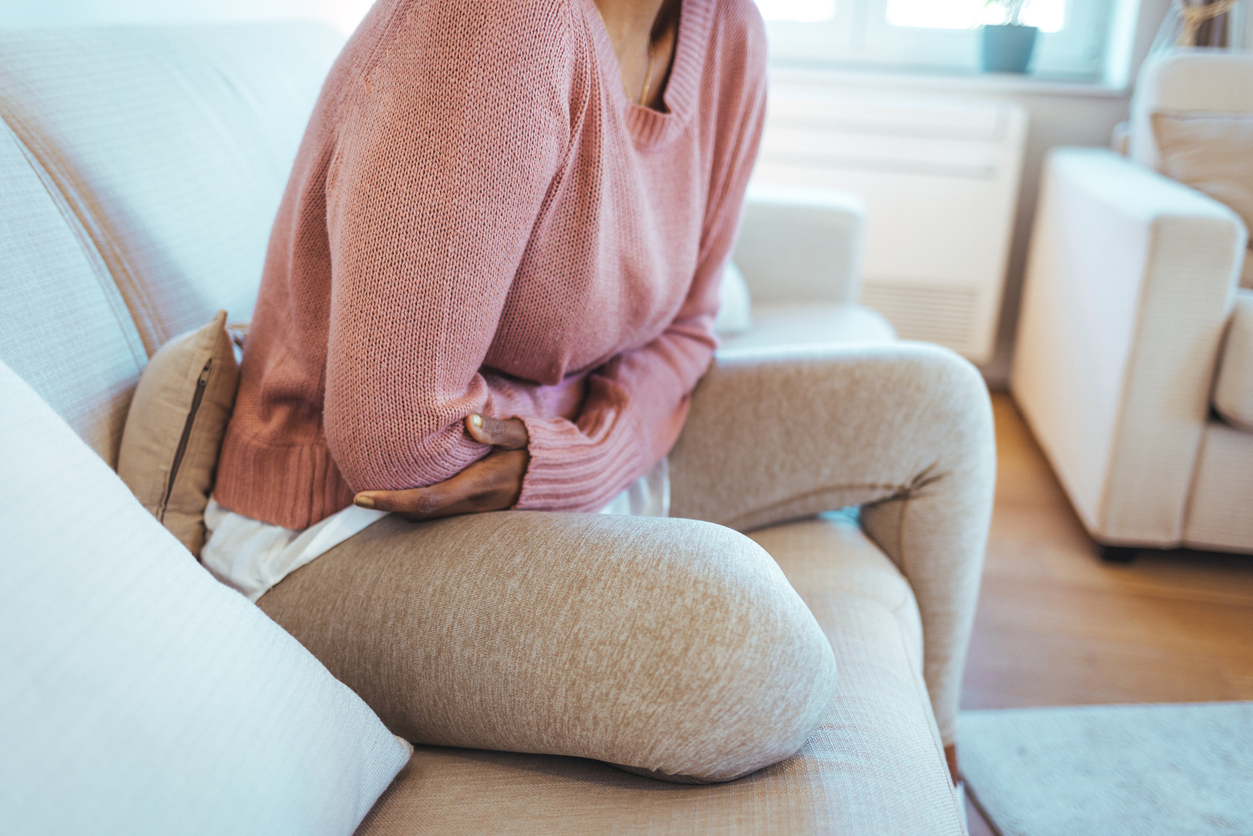PCOS can cause heavy bleeding and clotting along with severe period pain. But there are other symptoms of PCOS that are even more specific, such as irregular periods — often leading to fertility problems — excess facial hair, oily skin, acne and weight gain. If you’re also experiencing any of these symptoms — or if you have severe period pain regularly — it’s a good idea to see your GP so they can investigate whether your symptoms are caused by an underlying condition.
Many women experience period pain at some point in their lives. In the medical professional world, period pain is referred to as ‘dysmenorrhea’ or, more commonly, menstrual cramps — and is normal. Although this monthly pain is considered normal, it can range from mild discomfort to often severe, debilitating pain. For an estimated one in four women, period pain can be so severe it interferes with their daily lives and activities.
While it is common, period pain — especially when it’s severe regularly — could also be a sign of a more serious underlying condition. Certain lifestyle factors may also make you more likely to experience severe period pain. For instance, it’s more common in women aged 20 and younger and in those who started puberty before they reached the age of 11. Smoking, obesity, alcohol, anxiety and depression have all also been linked to period pain. Period pain is caused by contractions in your uterus (womb). During your period, the muscular wall of your uterus tightens so that it can shed its lining — the endometrium — which leaves your body through the vagina. This happens when the egg your ovary released during ovulation remains unfertilized, meaning you’re not pregnant, and the lining of the uterus is no longer needed (if the egg is fertilized it embeds itself in the lining, which thickens each month to prepare for pregnancy).
Understanding PCOS
Polycystic ovary syndrome (PCOS) is a condition in which the ovaries produce an abnormal amount of androgens, male sex hormones, that are usually present in women in small amounts. The name polycystic ovary syndrome describes the numerous small cysts (fluid-filled sacs) that form in the ovaries. However, some women with this disorder do not have cysts, while some women without the disorder do develop cysts.
In some cases, a woman doesn’t make enough of the hormones needed to ovulate. When ovulation doesn’t happen, the ovaries can develop many small cysts. These cysts make hormones called androgens. Women with PCOS often have high levels of androgens. This can cause more problems with a woman’s menstrual cycle. And it can cause many of the symptoms of PCOS.
What Does Regular Menstruation Feel Like?
Normal periods are different from person to person. They can also change over your lifetime. Periods usually come about once a month. When you first start having your period, the bleeding may last only a few days or be really light (meaning not that much blood comes out).
During your period, it’s normal to bleed anywhere from 2 to 7 days. It may seem like a lot of blood comes out, but most people only lose about 1—6 tablespoons of blood and tissue during each period. Period blood can be red, brown or pink. It’s also normal for it to be kind of clumpy at times.
During the first few years of your period, it might not always come at the same time every month. You may bleed more or less or have different PMS symptoms month-to-month. As you get older, periods usually get more regular and it’ll be easier to know what’s “normal” for you.
What Does a Painful Period Feel Like?
Dysmenorrhea is the medical term for pain with your period (menstruation) or menstrual cramps. There are two types of dysmenorrhea: primary and secondary.
Primary dysmenorrhea is the name for common menstrual cramps that come back over and over again (recurrent) and aren’t due to other diseases. The pain usually begins one or two days before you get your period or when the bleeding starts. You may feel pain ranging from mild to severe in the lower abdomen, back or thighs.
Pain can typically last 12 to 72 hours, and you might have other symptoms, such as nausea and vomiting, fatigue and even diarrhoea. Common menstrual cramps may become less painful as you get older and may stop entirely if you have a baby.
If you have painful periods because of a disorder or an infection in your female reproductive organs, it is called secondary dysmenorrhea. Pain from secondary dysmenorrhea usually begins earlier in the menstrual cycle and lasts longer than common menstrual cramps. You usually don’t have nausea, vomiting, fatigue or diarrhoea.
Tips To Manage Your Symptoms
Maintaining a healthy weight is a crucial part of controlling PCOS symptoms. People with PCOS commonly carry extra weight, which can increase their risk of diabetes, heart disease and other issues associated with metabolic syndrome.
Certain lifestyle changes, such as eating a balanced diet of healthful foods and getting more physical activity can help with weight loss and reduce the risk of health complications.
Changing the diet is an essential part of managing PCOS. People with PCOS tend to have higher levels of insulin, a hormone that the body uses to lower high blood sugar.
If the body has persistently high levels of insulin, it may stop responding to the hormone as well. As a result, blood sugar levels may remain high.
The medical name for this is insulin resistance, and it is a precursor to diabetes. Insulin resistance is very common in people with PCOS, and it can make maintaining a healthy weight difficult.
Insulin and blood sugar levels rise the highest after a person eats foods rich in carbohydrates, sugar or both.
Eliminating simple carbohydrates and sugar from the diet can help stabilize blood sugar levels and keep insulin levels low. This may mean avoiding products such as:
- white bread
- white pasta
- white rice
- cereal
- cookies
- chips
- soda
- juice
- granola bars
Unlike simple carbohydrates, complex carbs contain fibre and other nutrients and do not raise blood sugar levels as high. Some common sources of complex carbs include:
- whole grains
- whole-wheat bread and pasta
- brown rice
Exercise is an important component of weight loss. Regular exercise can help lower insulin levels, keep blood sugar levels low and improve heart health.
Getting a good workout does not have to mean hitting the gym — in fact, the most effective workout is an enjoyable one. Taking up a sport or an activity that is fun will encourage a person to engage in it consistently and get the most benefits.
Seeking Medical Advice
Pain during periods is common and PCOS by itself is usually not the cause. However, extreme period pain dizziness, fatigue and nausea are normal. Extreme period pain can be indicative of underlying conditions like endometriosis or fibroids, among others. If you are suffering from PCOS and have painful periods, speak to a doctor to understand what treatment options could best suit you to manage PCOS as well as menstrual cramps.
Learn More With Veera
Experts at Veera believe that PCOS is a broad spectrum and to manage PCOS means to take care of your menstrual hygiene as well. A major issue faced by women with respect to menstrual hygiene is period pain and our experts look into this problem during your PCOS management journey.




















